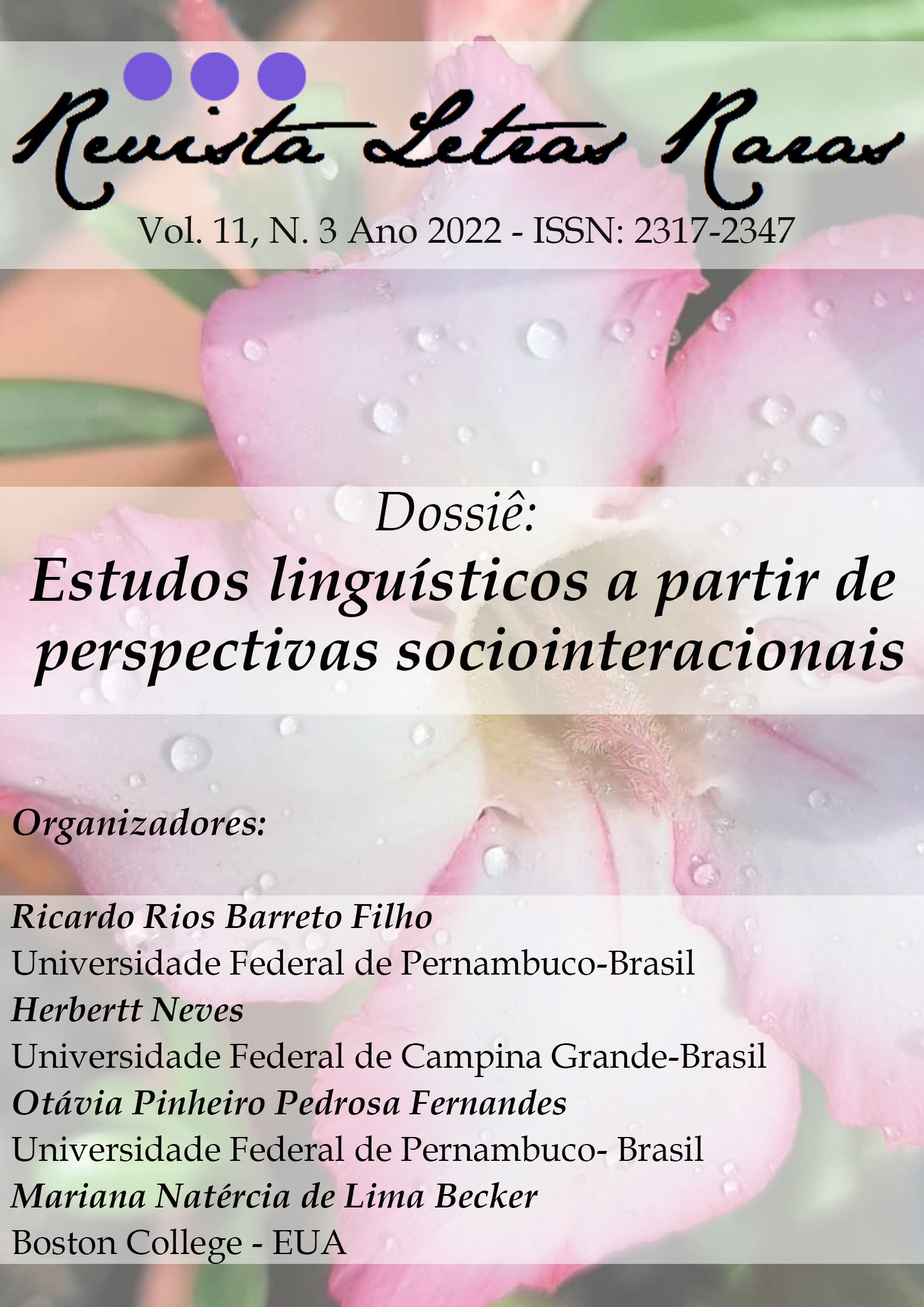Lexical selection and construction of argumentativeness in journalistic texts
DOI:
https://doi.org/10.5281/zenodo.8170205Palavras-chave:
Lexical selection, Argumentation, Textuality, Journalistic Texts, Verbal interactionResumo
This study aims to examine the argumentative positioning of comments on the 2018 elections, focusing on the use of items from the lexical system. The corpus is of twelve texts analyzed in a qualitative, descriptive and documentary research. It isevenly composed of the text genres opinion pieces and editorial. All texts were published by the three main news papers ofthe city of Recife during the second round of the 2018 elections. The focus is on the way in which nouns, adjectives andverbs linked to the theme of elections acted as contextualization cues (GUMPERZ, 2013) for the construction of the argumentative direction of the journalistic domain as a whole. We draw on a socio-interactional conception of language and lexicon (ANTUNES, 2012; MARCUSCHI, 2003; 2004; CARDOSO, 2015). Within our sample, we find a close relationshipamong the text genre, the definition of the author's position and the choice of lexical items related to the topic under debatein a text.
Downloads
Referências
ANTUNES, Irandé. Território das palavras: estudo do léxico em sala de aula. São Paulo: Parábola, 2012.
ANTUNES, Irandé. Aspectos da coesão do texto: uma análise em editoriais jornalísticos. Recife: Editora da UFPE, 1996.
ANTUNES, Irandé. Aspectos da coesão lexical na organização do texto escrito de comentário. 1992. 477 f. Tese (Doutorado) – Programa de Pós-Graduação em Linguística Portuguesa, Faculdade de Letras da Universidade de Lisboa, Lisboa, 1992.
CARDOSO, Elis de Almeida. O léxico na sala de aula: da teoria à prática pedagógica. In: VALENTE, André Crim (org.). Unidade e variação na língua portuguesa: suas representações. São Paulo: Parábola, 2015. p. 118-124.
GUMPERZ, John Joseph. Convenções de contextualização. In: RIBEIRO, Branca Telles; GARCEZ, Pedro Moraes (orgs.). Sociolinguística interacional. 2. ed. São Paulo: Edições Loyola, 2013. p. 149-182.
MARCUSCHI, Luiz Antônio. Produção textual, análise de gêneros e compreensão. São Paulo: Parábola, 2008.
MARCUSCHI, Luiz Antônio. O léxico: lista, rede ou cognição social? In: NEGRI, Ligia; FOLTRAN, Maria José; OLIVEIRA, Roberta Pires de (orgs.). Sentido e significação. Em torno da obra de Rodolfo Ilari. São Paulo: Contexto, 2004. p. 263-284.
MARCUSCHI, Luiz Antônio. O aspecto lexical no processo de textualização. Recife, 2003, 33 p. Projeto de Pesquisa não publicado.
NEVES, Herbertt. Argumentatividade das palavras: construção de aparato textual-interativo para o estudo do léxico e análise em textos do jornalismo recifense sobre as eleições de 2018. 2020. 259 f. Tese (Doutorado) – Programa de Pós-Graduação em Letras, Universidade Federal de Pernambuco, Recife, 2020.
PAIVA, Vera Lúcia Menezes de Oliveira e. Manual de pesquisa em estudos linguísticos. São Paulo: Parábola, 2019.
POLGUÈRE, Alain. Lexicologie et sémantique lexicale: notions fondamentales. 3. ed. Québec: Les Presses de l’Université de Montréal, 2016.
SEIXAS, Lia. Redefinindo os gêneros jornalísticos: proposta de novos critérios de classificação. Covilhã: LabCom Books, 2009.
Downloads
Publicado
Como Citar
Edição
Seção
Licença
Copyright (c) 2023 Revista Letras Raras

Este trabalho está licenciado sob uma licença Creative Commons Attribution-NonCommercial 4.0 International License.







